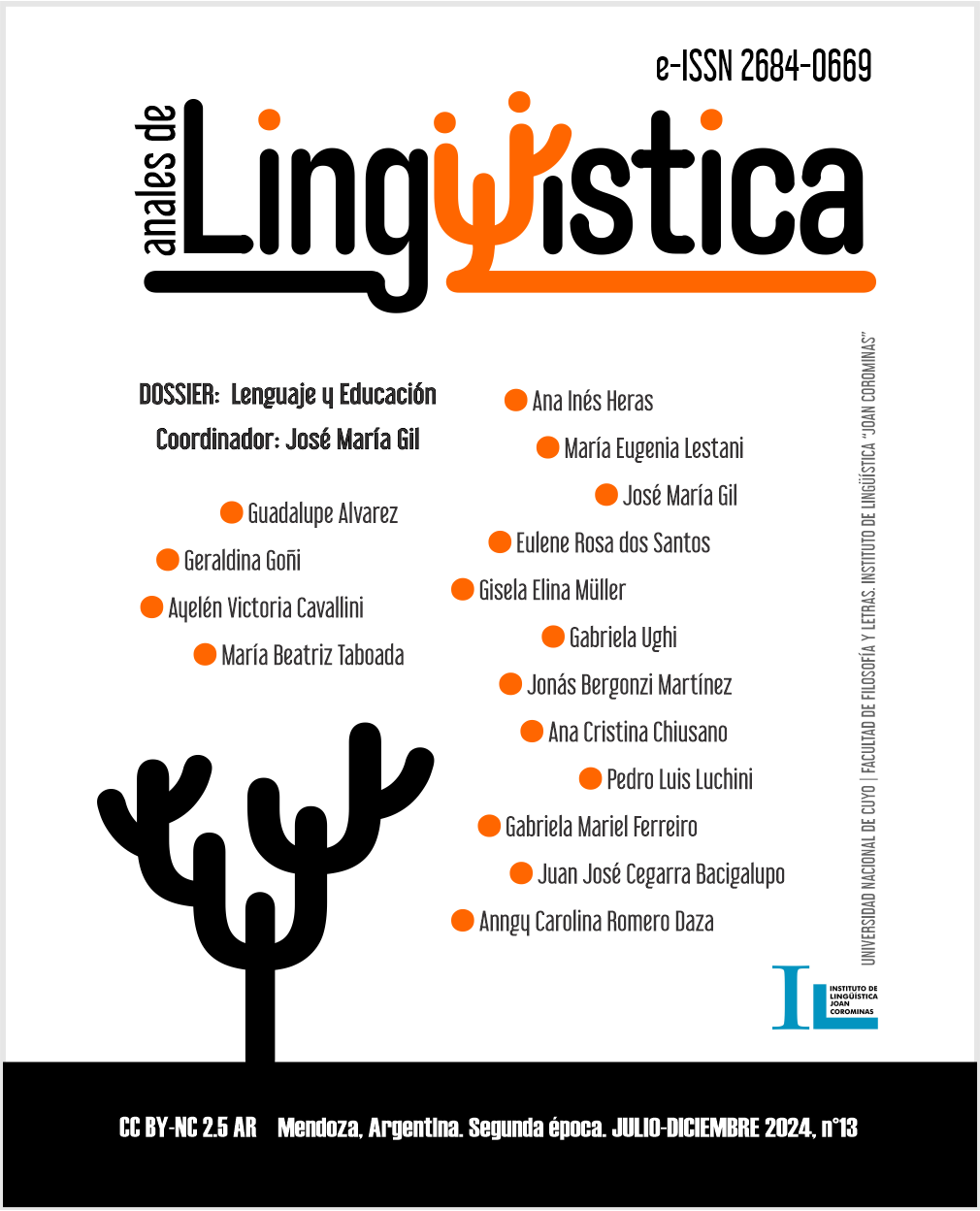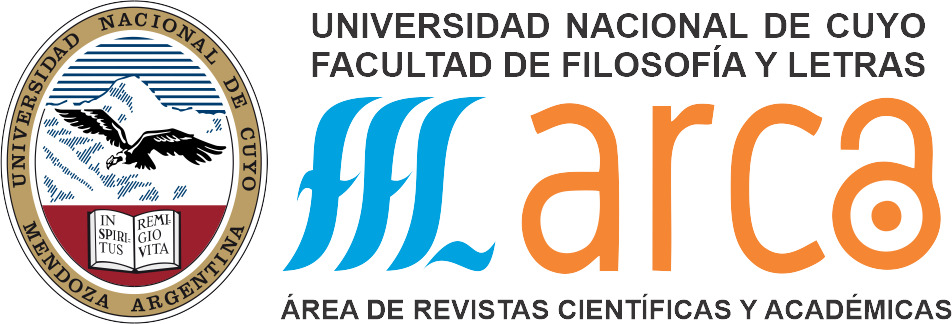Digital Technologies in Exploratory Readings and Writings of PhD Students in Humanities and Social Sciences
DOI:
https://doi.org/10.48162/rev.57.001Keywords:
research, literacy, dissertation, information technology, artificial intelligenceAbstract
With the advent of digital technologies, new alternatives emerge for the work of research trainees and also for the written communication of research, including the dissertation. Up to this point, however, no qualitative research in the Latin America region has been recorded that specifically focuses on the search and processing of information mediated by technologies during dissertation production. Based on the perspective of PhD students in Humanities and Social Sciences from Argentine universities, this study seeks to understand exploratory readings and writings carried out with digital technologies in the context of dissertation work. These practices are basic to any scientific activity because they aim at collecting and processing previous contributions relevant to a research, contributions that, among other functions, allow establishing the field of study, delimiting the problem and its investigation, and guiding us about theoretical and methodological frameworks. A qualitative study based on in-depth interviews and documentary analysis is conducted, involving 9 doctoral students in Social and Human Sciences from Argentine national universities. The analysis reveals findings regarding the digital technologies used in exploratory readings and writings, their modes of use, associated benefits and challenges, as well as learning methods related to these technologies. The study concludes that exploratory readings and writings in relation to dissertations are currently mediated by digital technologies, and that such technology use, in connection with these activities, represents fundamental knowledge-building skills in the 21st century.
References
Adekunle, A. y Madukoma, E. (2022). An Assessment of Information Literacy Competence of Doctoral Students in Universities in Ogun State. Library Philosophy and Practice (e-journal), 7172. https://digitalcommons.unl.edu/libphilprac/7172
Andrews, R., Borg, E., Boyd Davis, S., Domingo, M. y Englan, J. (Eds.) (2012). The SAGE Handbook of Digital Dissertations and Theses. SAGE.
Barsky, O. y Dávila, M. (2016). El desarrollo de las carreras de posgrado en la Argentina: Características generales, problemas recurrentes y desafíos. Revista de Educación Superior del Sur Global, 2, 64-86.
Barrot, J. S. (2023). Using ChatGPT for second language writing: Pitfalls and potentials. AssessingWriting, 57, 100745. https://doi.org/10.1016/j.asw.2023.100745
Bertolini, A. (2019). Las soledades de los doctorandos. Una aproximación pedagógica. Revista de Educación, 11(19), 163-183. https://fh.mdp.edu.ar/revistas/index.php/r_educ/article/view/4037
Burbules, N. y Callister, T. (2001). The risks and promises of new information technologies for education. Routledge.
Burford, J., Amell, B.yBadenhorst, C. (2021). Introduction: The case for re-imagining doctoral writing. En C. Badenhorst, B. Amell, y J. Burford (Eds.), Re-imagining doctoral writing (pp. 3–28). University Press of Colorado.
Carpenter, J. (2012). Researchers of tomorrow: the research behaviour of generation y doctoral students. Information Services & Use, 32(1-2), 3-17. https://content.iospress.com/articles/information-services-and-use/isu637
Castelló, M. (2022a). Escritura e identidad en contextos de investigación. Literatura y Linguística, 46, 29-59. DOI: 10.29344/0717621X.46.3157
Castelló, M. (2022b). Research writing, what do we know and how to move forward. En M. Gustafsson y A. Eriksson (Eds.), Academic writing at intersections-Interdisciplinarity, genre hybridization, multilingualism, digitalization, and interculturality (EATAW) (pp- 89-122). Clearinghouse.
Castelló, M. (2020). Escribir (leer) e investigar: voces en diálogo. En D. LopesDias, I. Rodrigues y J. Quintiliano Guimarães Silva (Orgs.), Práticas discursivas emletramentoacadêmico: questõesemestudo. Volume 3.Estudos aplicados à prática da escrita acadêmica: colocando a mão na massa (pp. 110-135). PUC Minas. https://www.editora.pucminas.br/arquivos/obra/arquivo_digital/219/praticas_discursivasv3.pdf
Castelló, M. y Donahue, C. (Eds.) (2012). University writing: Selves and texts in academic societies. BrillAcademicPublishers.
Castelló, M., Sala-Bubaré, A. y Bautista, A. (2017). Being a Researcher Is Not Only a Matter of Publishing: Learning To Review Scientific Articles. Journal for the Study of Education and Development, 40(3), 599-656. https://doi.org/10.1080/02103702.2017.1357251
Creswell, J.W. (2013). Research Design: Qualitative, Quantitative, and Mixed Methods Approaches. SAGE Publications.
Calle-Arango, L. y Ávila Reyes, A. (2023). Obstacles, facilitators, and needs in doctoral writing: A systematic review. Studies in Continuing Education, 45,(2). 133-151. https://doi.org/10.1080/0158037X.2022.2026315
Ciampa, K., y Wolfe, Z. (2020). From isolation to collaboration: creating an intentional community of practice within the doctoral dissertation proposal writing process. Teaching in Higher Education, 28, 487-503. https://doi.org/10.1080/13562517.2020.1822313
Cisco, J. (2020). Exploring the connection between impostor phenomenon and postgraduate students feeling academically-unprepared. Higher Education Research y Development, 39(2), 200-214.
de Marinis, P. (2020). Revisión de antecedentes (RA), estado del arte (EA) y marco teórico (MT). En C. Wainerman (Coord.), En estado de tesis. Cómo elaborar el proyecto de tesis en ciencias sociales (pp. 117-153). Manantial.
Dergaa, I, Chamari, K., Żmijewski, P., & Saad, H. (2023). From human writing to artificial intelligence generated text: examining the prospects and potential threats of ChatGPT in academic writing. Biology of Sport, 40(2), 615-622. https://doi.org/10.5114/biolsport.2023.125623
Graham. K., Rios, A., y Viruru, R. (2023). Constructing radical community: an ecological model for shifting from an EdD to a We dD in online doctoral programs. Higher Education, 85, 301–323 309. https://doi.org/10.1007/s10734-022-00834-8
Gómez Restrepo, A. M., (2012). Comportamiento en la búsqueda de información: el caso de los estudiantes de postgrado. Revista Interamericana de Bibliotecología, 35(2),133-148. https://www.redalyc.org/articulo.oa?id=179026369002
Gouseti, A. (2017). Exploring Doctoral Students’ Use of Digital Technologies: What Do They Use Them For and Why? Educational Review, 69 (5), 638–654. https://doi.org/10.1080/00131911.2017.1291492
Guerin, C., Aitchison, C. y Carter, S. (2019). Digital and distributed: learning and teaching doctoral writing through social media. Teaching in Higher Education, 25(2), 238-254. https://doi.org/10.1080/13562517.2018.1557138
Guerin, C., Carter, S. y Aitchison, C. (2015). Blogging as Community of Practice: Lessons for Academic Development? International Journal for Academic Development, 20 (3), 212–223. doi:10.1080/1360144X.2015.1042480.
Kuhn, V., y Finger, A. (2021). Shaping the Digital Dissertation. Knowledge Production in the Arts and Humanities. One Book Publishers.
Kumar, S., Kailasapathy, P., y Mudiyanselage, A. S. (2021). It’s my luck: Impostor fears, the context, gen-der and achievement-related traits. Personnel Review 51(9), 2222-2238. https://doi.org/10.1108/PR-03-2021-0149
Lei, J., y Hu, G. (2019). Doctoral candidates’ dual role as student and expert scholarly writer: An activity theory perspective. English for Specific Purposes, 54, 62-74. https://doi.org/10.1016/j.esp.2018.12.003
Lupton, D., Mewburn, I. y Thomson, P. (2018). The Digital Academic. Critical Perspectives on Digital Technologies in Higher Education. Routledge.
Miras, M. y Solé, I. (2007). La elaboración del conocimiento científico y académico. Castello Badía, M. (Coord.). Escribir y comunicarse en contextos científicos y académicos: conocimientos y estrategias (pp. 83-112). Graó.
Nichols, T.P. y Le Blanc, R.J. (2020). Beyond Apps: Digital Literacies in a Platform Society. The Reading Teacher, 74(1), 103–109. https://doi.org/10.1002/trtr.1926
Nori, H., y Vanttaja, M. (2022). Too stupid for PhD? Doctoral impostor syndrome among Finnish PhD students. Higher Education 86, 675-691. https://doi.org/10.1007/s10734-022-00921-w
Paltridge, B. (2020). Writing for Academic Journals in the Digital Era. RELC Journal, 51(1), 147-157. https://doi.org/10.1177/0033688219890359
Paré, A. (2019). Re-writing the doctorate: New contexts, identities, and genres. Journal of Second Language Writing, 43, 80-84. https://doi.org/10.1016/j.jslw.2018.08.004
Pigg, S. (2024). Research writing with ChatGPT: A descriptive embodied practice framework. Computers and Composition, 71, 102830. https://doi.org/10.1016/j.compcom.2024.102830
Prior, P. (2015). Writing, literate activity, semiotic remediation. En G. Cislaru (ed.). Writing(s) at the Crossroads: The process–product interface (pp. 185-201). John Benjamins Publishing Company
Saldaña, J. (2013).The coding manual for qualitative researchers. Sage.
Shahsavar, Z. y Kourepaz, H. (2020). Postgraduate students' difficulties in writing their thesis literature review. CogentEducation, 7(21), 1-11. https://doi.org/10.1080/2331186X.2020.1784620
Silberzahn, R. y Uhlmann, E. (2015). Crowdsourced Research: Many Hands Make Tight Work. Nature News, 526 (7572), 189–191.
Spezi, V. (2016). Is Information-Seeking Behavior of Doctoral Students Changing?: A Review of the Literature (2010–2015). New Review of Academic Librarianship, 22(1), 78-106. http://dx.doi.org/10.1080/13614533.2015.1127831
Stein, S., Sim, K. N. y Rose, M. (2022, December 4-7). Reconnecting People with Educational Technology and with each other in an Online Doctoral Study Setting [Pecha Kucha Presentation]. 39th International Conference on Innovation, Practice and Research in the Use of Educational Technologies in Tertiary Education, ASCILITE 2022, Sydney, NSW, Australia. https://doi.org/10.14742/apubs.2022.43
Stewart, B. (2015). Open to Influence: What Counts as Academic Influence in Scholarly Networked Twitter Participation. Learning, Media and Technology, 40 (3), 287–309. doi:10. 1080/17439884.2015.1015547.
Su, Y., Lin, Y., y Lai, C. (2023). Collaborating with ChatGPT in argumentative writing classrooms. Assessing Writing, 57, 100752. https://doi.org/10.1016/j.asw.2023.100752
Sugimoto, C., Work, S., Larivière, L., Haustein, S. (2017). Scholarly Use of Social Media and Altmetrics: A Review of the Literature. Journal of the Association for Information Science and Technology, 68 (9), 2037–2062. doi:10.1002/asi.23833.
UNESCO (2023). ChatGPT and artificial intelligence in higher education. Retrieved October 29, 2023. https://unesdoc.unesco.org/ark:/48223/pf0000385146
Valencia Quecano, L. I., Guzmán Rincón, A. y Barragán Moreno, S. (2024). Dropout in postgraduate programs: a underexplored phenomenon – a scoping review. Cogent Education, 11(1). https://doi.org/10.1080/2331186X.2024.2326705
Van Dijk, J. (2013). The Culture of Connectivity: A Critical History of Social Media. Oxford University Press.
Vitae (2011). Vitae Researcher Development Framework (RDF). https://www.vitae.ac.uk/vitaepublications/rdf-related/researcher-development-framework-rdf-vitae.pdf
Wainerman, C. y Matovich, I. (2016). El Desempeño en el Nivel Doctoral de Educación en Cifras: Ausencia de Información y Sugerencias para su Producción. Archivos Analíticos de Políticas Educativas, 24, 1-19. https://www.redalyc.org/pdf/2750/275043450110.pdf
Wilson, S., y Cutri, J. (2019). Negating isolation and imposter syndrome through writing as product and as process: The impact of collegiate writing networks during a doctoral programme. En L. Pretorius, L. Macaulay y B. Cahusac de Caux (Eds.), Wellbeing in doctoral education: Insights and guidance from the student experience (pp. 59-76). Springer. https://doi.org/10.1007/1978-1981-1013-9302-1000_1007
Yuvayapan, F. y Bilginer, H. (2020). Identifying the needs of postgraduate students: the first step of academic writing courses. Journal of Language and Linguistic Studies, 16(2), 595-611. https://doi.org/10.17263/jlls.759260
Downloads
Published
How to Cite
Issue
Section
License
Copyright (c) 2024 Guadalupe Alvarez
Esta obra está bajo una Licencia Creative Commons Atribución 2.5 Argentina.
Los/as autores/as que publican en esta revista están de acuerdo con los siguientes términos:
1. Los/as autores conservan los derechos de autor y garantizan a la revista el derecho de ser la primera publicación del trabajo bajo una licecncia Creative Commons Atribución 2.5 Argentina (CC BY 2.5 AR) . Por esto pueden compartir el trabajo con la referencia explícita de la publicación original en esta revista.
2. Anales de lingüística permite y anima a los autores a difundir la publicación realizada electrónicamente, a través de su enlace y/o de la versión postprint del archivo descargado de forma independiente.
3. Usted es libre de:
Compartir — copiar y redistribuir el material en cualquier medio o formato
Adaptar — remezclar, transformar y construir a partir del material para cualquier propósito, incluso comercialmente.












